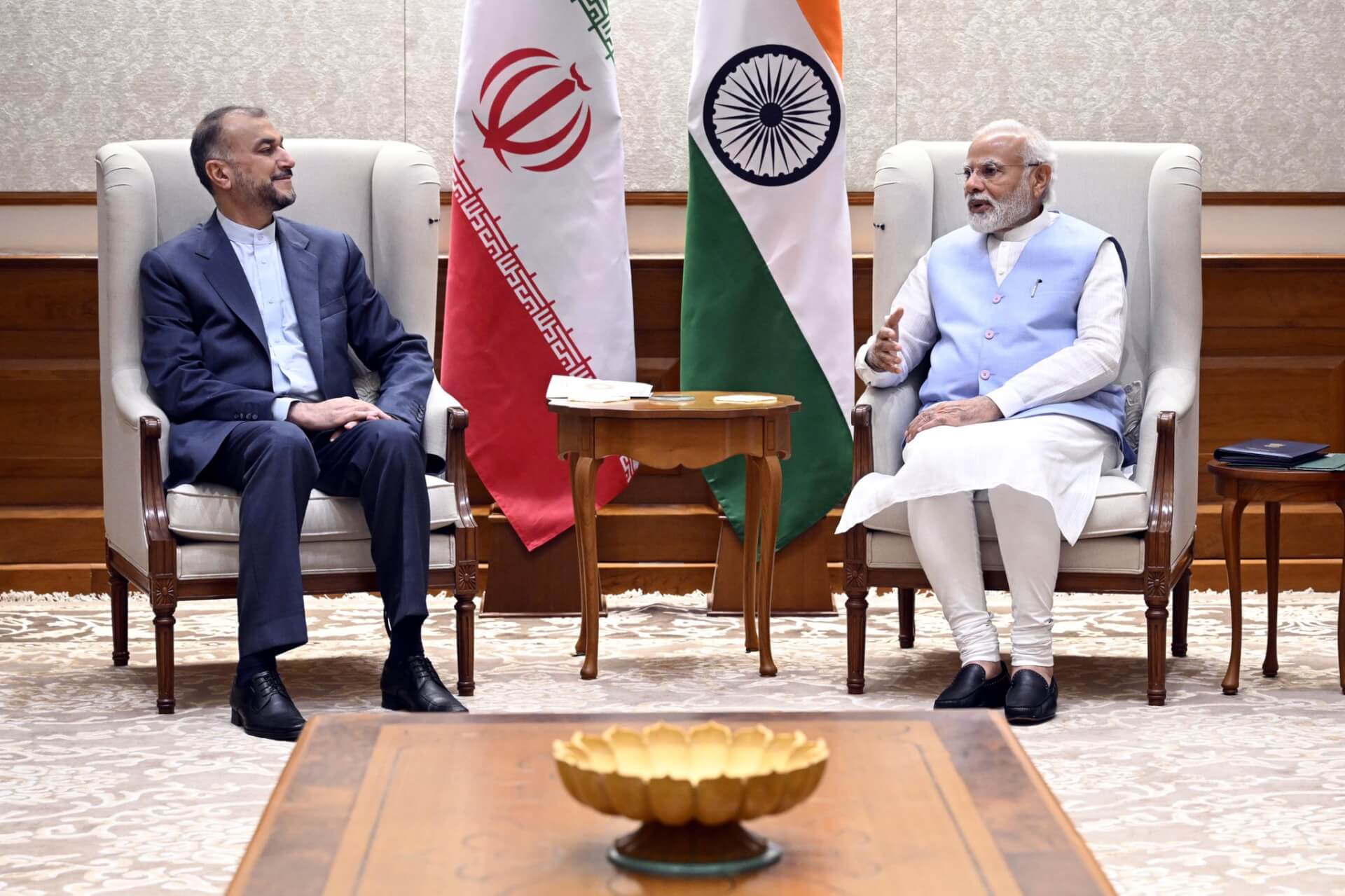Iranian Foreign Minister (FM) Hossein Amir Abdollahian arrived in New Delhi on Wednesday to hold “strategic consultations” with high-ranking Indian officials. During his tour, he met with Indian Prime Minister (PM) Narendra Modi, External Affairs Minister (EAM) S. Jaishankar, and National Security Advisor (NSA) Ajit Doval.
The following is a brief summary of his visit:
Meeting with EAM S. Jaishankar
During talks with his Indian counterpart, Abdollahian discussed a “broad range” of issues in the strategic, economic, political, and cultural fields. He called for the establishment of a “roadmap to promote comprehensive and vast strategic ties” as well as “regulate long-term bilateral ties and protect the relations from detrimental factors.”
Wide ranging discussion with FM @Amirabdolahian of Iran.
— Dr. S. Jaishankar (@DrSJaishankar) June 8, 2022
Reviewed our bilateral cooperation, including in trade, connectivity, health and people to people ties.
Exchanged views on global and regional regional issues including JCPOA, Afghanistan and Ukraine. pic.twitter.com/eADoLWkyiE
Both envoys also agreed that their countries should continue to work together to ensure that there is “peace and stability” in Afghanistan. In this respect, the duo emphasised the need to help Afghanistan overcome its economic and humanitarian crisis.
They also stressed that the “formation of an inclusive government in Afghanistan is the most important approach to persuading all ethnic groups and factions of Afghanistan to play a role in deciding their country’s fate.”
Pleased to meet PM Modi, FM Jaishankar & other Indian officials to advance our bilateral strategic dialogue.
— H.Amirabdollahian امیرعبداللهیان (@Amirabdolahian) June 8, 2022
Tehran & New Delhi agree on the need to respect divine religions & Islamic sanctities & to avoid divisive statements.
🇮🇷🇮🇳 determined to bring relations to new heights.
Moreover, Jaishankar underscored the necessity to boost economic and trade cooperation and called for the formation of new working groups to follow up on the matter. “The top Indian diplomat in other comments also spoke about the need to give momentum to cooperation in expanding Chabahar Port and other transit routes and common regional corridors,” the Iranian Foreign Ministry said.
A statement released by the Ministry of External Affairs (MEA) added that the Chabahar Port played an important role in the field of regional connectivity. “The sides agreed that the Chabahar Port has provided much needed sea-access to landlocked Afghanistan and has also emerged as a commercial transit hub for the region, including for Central Asia,” the MEA stated.
Jaishankar also thanked Iran for facilitating the administration of COVID-19 vaccines to Afghan refugees in the country. Furthermore, they discussed the JCPOA and the regional and global implications of the Ukraine war.
The Iranian foreign ministry revealed that the pair signed a judicial assistance deal relating to civil and trade affairs. Further details have not been revealed at this stage.
Iranian FM #Amirabdollahian has held two rounds of talks with his #Indian counterpart Subrahmanyam Jaishankar.
— Iran Foreign Ministry 🇮🇷 (@IRIMFA_EN) June 9, 2022
In the meeting, a broad range of issues of mutual interest between the two countries in strategic, political, economic and cultural spheres were discussed. pic.twitter.com/6fUi74z7Wu
Meeting with NSA Ajit Doval
Abdollahian impressed upon Doval the need for “expanding all-out ties” between their countries and “proposed the formation of a strategic committee to expand ties in all spheres.” Abdollahian also called on New Delhi to boost bilateral relations with Tehran “as much as possible, irrespective of third parties and opposing factors.”
They also discussed the “negative atmosphere” created in India following the insult of Islamic religious figure Prophet Muhammad by two Bharatiya Janata Party (BJP) officials. Doval “reaffirmed the Indian government and officials’ respect” for the Prophet and said offenders will be punished “in such a way that others will learn a lesson.”
Abdollahian, in turn, “hailed the Indian people and government for their respect for the divine faiths [and] for the religious tolerance, historical coexistence and friendship among followers of various religions in the country.”
In addition, the FM called for greater security and military ties, and increased cooperation in combatting terrorism.
The Iranian diplomat said the two countries must broaden bilateral engagements “regardless of third parties or those who oppose closer Tehran-New Delhi relations,” in a thinly veiled reference to Western powers such as the United States.
Meeting with PM Narendra Modi
Was happy to receive Foreign Minister Hossein Amirabdollahian for a useful discussion on further development of Centuries-old civilizational links between India and Iran. Our relations have mutually benefited both the countries and have promoted regional security and prosperity. pic.twitter.com/Ef5Sbtj7Gb
— Narendra Modi (@narendramodi) June 8, 2022
Modi praised the improvement in bilateral ties, especially following the outbreak of the COVID-19 pandemic. He stressed that New Delhi and Tehran should carry this momentum forward and should work to “accelerate exchanges in the post-COVID era.”
“Our relations have mutually benefited both the countries and have promoted regional security and prosperity,” the PM said. Modi also requested the Iranian FM to express his interest in meeting President Ebrahim Raisi soon. Modi also asked Abdollahian to convey his regards to Supreme Leader Ali Khamenei.
Iran is one of India’s closest partners in the Gulf region and Tehran was once the second-largest supplier of crude oil to New Delhi. However, following the reimposition of sanctions on Iran by the United States, India suspended all imports of oil from Iran. More recently, however, India has expressed a willingness to improve ties with Iran. On Tuesday, India even abstained from voting for a resolution that condemned Iran for concealing its nuclear activities, by the International Atomic Energy Agency’s (IAEA) 35-member Board of Governors.
In a similar vein, the Iranian FM said upon his arrival that bilateral ties are “at a very good level [...] ever since the new (Raisi) administration took office.”
Abdollahian is also expected to meet with religious scholars and Iranian businesspeople and expatriates during his trip. He is scheduled to make stops in Mumbai and Hyderabad.

